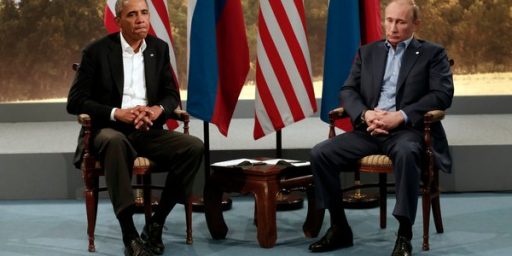Clinton Warns Syria On Chemical Weapons
Secretary of State Clinton issued a strongly worded warning to the Assad regime while in Turkey after reports that the Syrian government may be moving its stockpile:
PRAGUE — Secretary of State Hillary Rodham Clinton on Monday warned President Bashar al-Assad of Syria not to use chemical weapons and said that the United States was prepared to act if he ignored the warning.
“This is a red line for the United States,” Mrs. Clinton said. “I am not going to telegraph in any specifics what we would do in the event of credible evidence that the Assad regime has resorted to using chemical weapons against their own people. But suffice it to say we are certainly planning to take action if that eventuality were to occur.”
There have been signs in recent days of heightened activity at some of Syria’s chemical weapons sites, according to American and Israeli officials familiar with intelligence reports. Mrs. Clinton did not confirm the intelligence reports or say what sort of activity was occurring.
The Syrian Foreign Ministry, in a swift response, said the government “would not use chemical weapons, if it had them, against its own people under any circumstances.” The statement was reported on Syrian state television and on the Lebanese channel LBC.
Mrs. Clinton, who made her comments after meeting with Karel Schwarzenberg, the foreign minister of the Czech Republic, indicated that the two sides had discussed the situation in Syria, including the potential chemical weapons threat.
Mr. Schwarzenberg described the situation in Syria as “rather chaotic” and “highly dangerous.” He said that Czech troops who specialize in the detection of chemical weapons and decontamination were in Jordan training with forces there.
An American task force has been deployed to Jordan and has been helping the Jordanians deal with the escalating humanitarian crisis, including an exodus of more than 200,000 refugees from Syria to Jordan. The force is also planning how to respond, if necessary, to a chemical weapons threat.
Noah Schatchman and Spencer Ackerman report that what the U.S. has detected includes activity that suggests that the Syrians may be preparing to use the weapons:
Engineers working for the Assad regime in Syria have begun combining the two chemical precursors needed to weaponize sarin gas, an American official with knowledge of the situation tells Danger Room. International observers are now more worried than they’ve even been that the Damascus government could use its nerve agent stockpile to slaughter its own people.
The U.S. doesn’t know why the Syrian military made the move, which began in the middle of last week and is taking place in central Syria. Nor are they sure why the Assad government is transferring some weapons to different locations within the country, as the New York Times reported on Monday.
All that’s certain is that the arms have now been prepped to be used, should Assad order it.
“Physically, they’ve gotten to the point where the can load it up on a plane and drop it,” the official adds.
Sarin gas has two main chemical components — isopropanol, popularly known as rubbing alcohol, and methylphosphonyl difluoride. The Assad government has more than 500 metric tons of these precursors, which it ordinarily stores separately, in so-called “binary” form, in order to prevent an accidental release of nerve gas.
Last week, that changed. The Syrian military began combining some of the binaries. “They didn’t do it on the whole arsenal, just a modest quantity,” the official says. “We’re not sure what’s the intent.”
Previously, the Syrian government has said that it would never use chemical weapons on its own population, but that it reserved the right to utilize them against outside forces in case of foreign intervention in the country’s civil war. It was the first public acknowledgment by the Syrian regime that it had a chemical weapons program that had been an open secret for many years. Now, though, the war seems to be taking a more dangerous turn, with the rebels becoming more daring in their attacks on government forces and targets. If the government feels like it’s on its last legs, they may have few compunctions about using the weapons. At that point, foreign intervention of some kind would seem to be inevitable.





I’ve always been a bit unsure why we view gas weapons as WMDs deserving a special level of response. They are awful, obviously, but high explosives aren’t exactly a picnic, either. I get nuclear and biological, but to me poison gas has never quite belonged with those two.
Just the same, if the line has been drawn, then we’re going to have to take very serious steps. I assume some punitive strikes and a no-fly zone.